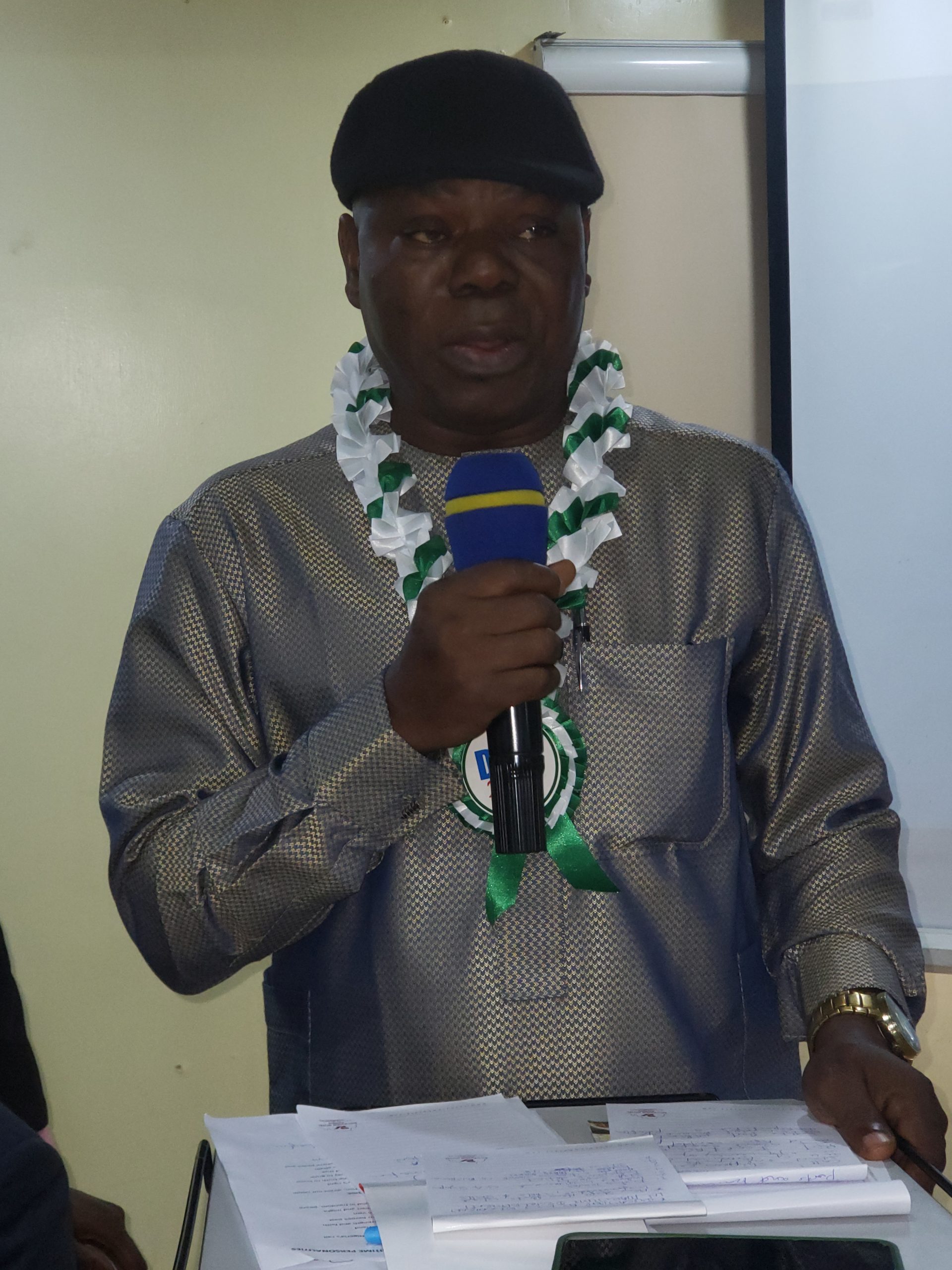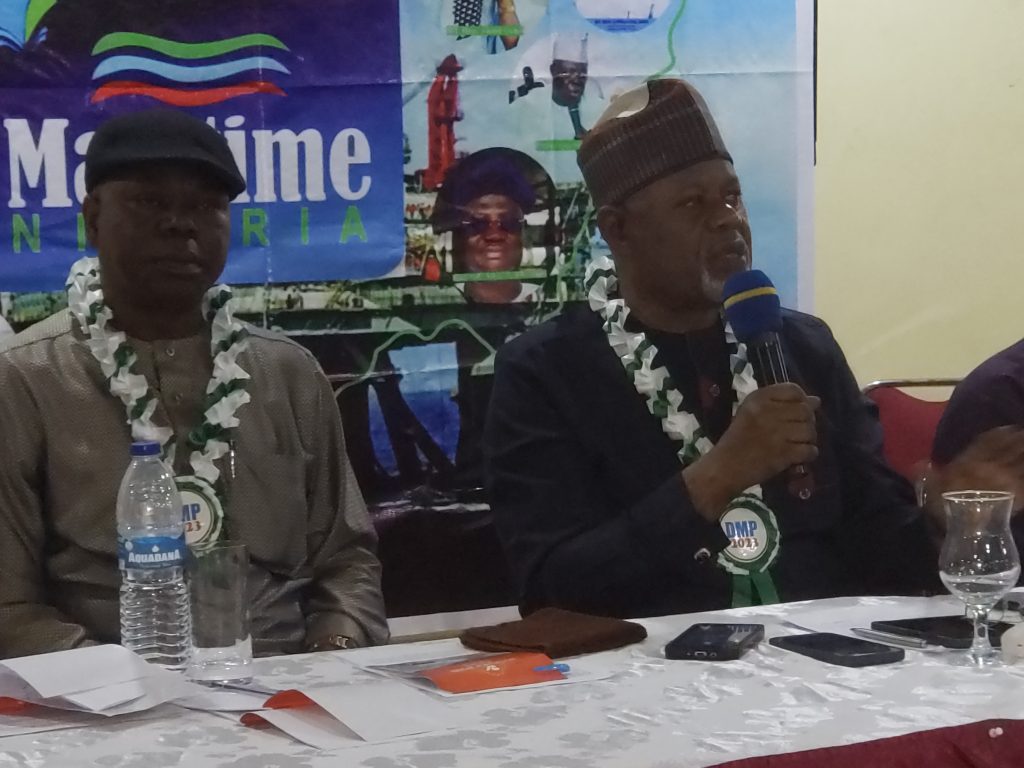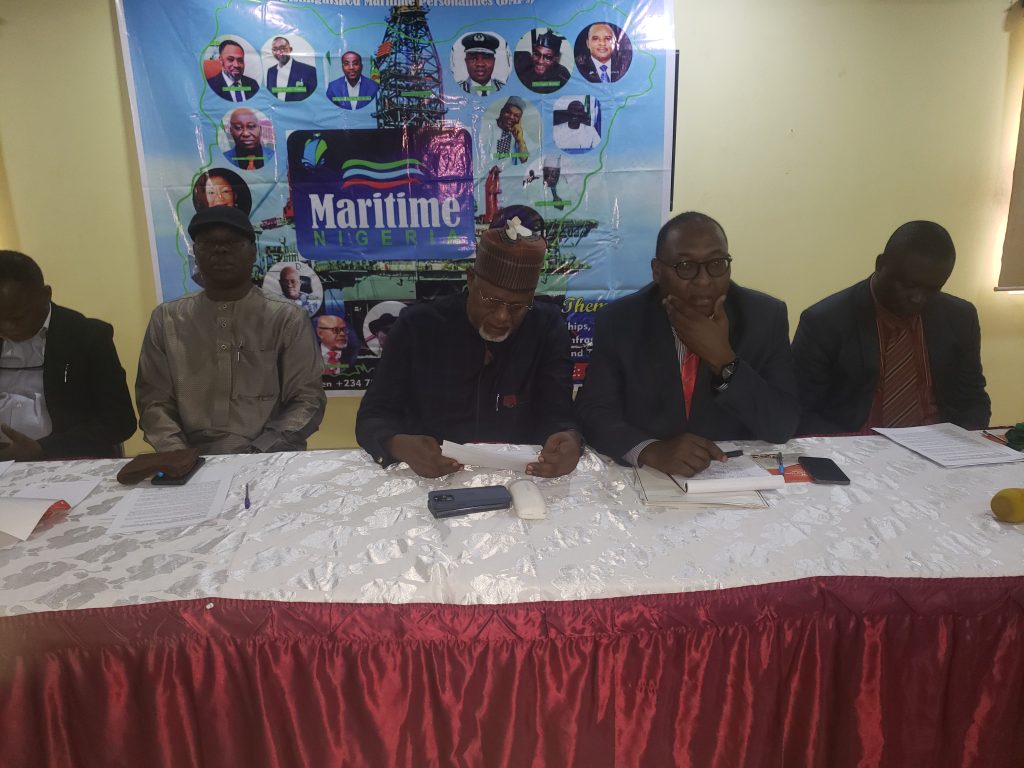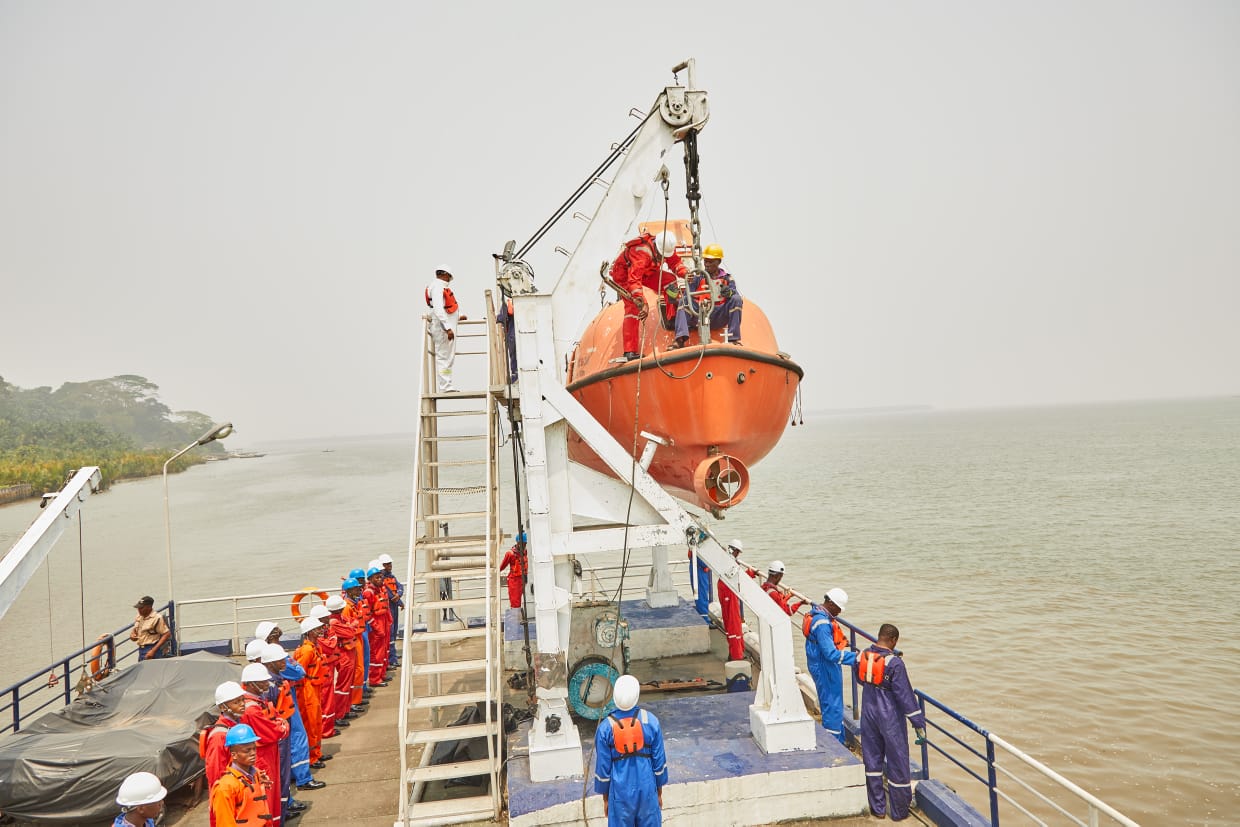Maritime
‘We’ve depended on foreign ships for sea time training long enough’ Okorefe

BY EGUONO ODJEGBA
A lecturer with the Nigeria Maritime University, Mr. Charles Okorefe has appealed to politicians and political leaders to think less of themselves and help develop the country’s maritime capacity.
Okorefe who was speaking during a workshop tagged National Discourse organized by the publishers of Nigerian Maritime Newspaper at the Rockview Hotel Apapa Lagos Tuesday, November 7, 2023, with the theme ‘New ships, New ports, What Infrastructure, Tools and Skills’, said education and proper training is key to the development of the maritime industry.

Okorefe left and Engr. Greg Ogbeifun during the event

He however lamented that maritime training is suffering on all fronts, using his school, Nigerian Maritime University Okorenkoko as example; and challenge the federal government to address the issue of sea time training ship for Nigerian cadets.
Ladies and gentlemen, the chairman, I want to stand on all existing protocols. Well, we are looking at a theme, New ships, New ports, What Infrastructure, Tools and Skills… and from, sorry, I don’t have a physical paper to present I just want to give a talk, maybe toe the line of my predecessors who have spoken here before me and you will agree that they have said almost all that we need to know about the industry, talking about ships, talking about ports in Nigeria and every other thing that goes with it. Now I have to speak on education as key element in maritime development. And I would like to start by saying that you cannot talk about anything in modern times without a background in education. In other words, if you want to be professional in whatever you are doing… as journalists you cannot just come here and start writing anything without having gone through the rudiments of the schools of journalism. Otherwise somebody will look at you and spot you immediately that this man is an interloper into the maritime profession. I guess I am right about that. So also the maritime industry, as we all know, is key to the development of any economy, especially for those nations who are littoral, who have access to the sea, even those who are landlocked. They also have a way of trying to key into the system by being friendly to those neighbors of theirs who have access to the sea. Chad, Niger Republic for instance, cannot afford not to be friendly with their neighbors who have access to the sea because we know the implication of that.
Now, I also want to say that majority of us in the industry today came into the industry by accident… talking about the maritime industry now, a lot of people were not trained, apart from our core members here who were trained as master mariners, a lot of practitioners came in by accident and I say that as a matter of fact. Now we have institutes, we the Nigerian Maritime University where I lecture to train the next crop of generation of practitioners who will take over from those who have been in the system, who have given their all to the development of the maritime sector in Nigeria. We have had the Maritime Academy Oron churning out cadets to take over from our core professionals. The question we want to ask is how well are these institutions doing to train our young ones who are coming up in the industry?
I think a lot of gap still exists and we need to speak to that. For instance, where I lecture, the Nigerian Maritime University is new by all consideration, but let not be deceived, we are about to graduate the third set, yet a lot of people do not even know that that university has taken off. It’s a tragedy because a lot is going on that is not reported about that university, so it is also a challenge to you journalists to go there and dig deep into what is going on in that university, there’s a lot of deficit, both in terms of infrastructure, both in terms of even manpower. The environment is very challenging, both for those who work there and the students themselves. So a lot of despondency is there. So these are fundamental issues. I happen to be one of the people that drafted the academic brief and the curriculum for that university. That was between 2013 and 2015 and in the course of doing that, we undertook some trips to Singapore and Liverpool, Liverpool John Moores University to be specific. What we found out was that some of the cadets from Nigeria that were sent there for training, the NSDP program, they were going through torture. What kind of torture? No vessels for sea time because Nigeria had no vessels. So they had to rely on nations that have vessels, like India and others who also send students there. They have to wait until there is a little allowance, space for our students to be squeezed in. And that has made some of them to spend longer than necessary in their studies there. So there are lot of despondency among the student population. Luckily, we were led there by Ezekiel Agaba, the former ED NIMASA, who happened to be an alumnus of that institution. So the moment the students saw us, it was as if Jesus has come down, that everything they were lacking will be provided, I just laughed. And when they were sending us off, I intentionally sat by the man, one Indian, Mr. Vikas, who was in charge of training…that is putting those students on board training vessels. And the man said, Nigeria has to up her game in terms of providing training vessels for her student population. You recall we had a vessel called MV Trainer which was attached to MAN Oron, we all know the story behind that vessel, how it evaporated from the system. That is a major deficit in the training of our student population for seafaring.
Then the academic programmes, how synchronized are they to the tunes of the modern times? We hd Capt Alao talking about smart ports, smart ships, the vessels we have these days are smart, that requires adequate knowledge and training for whoever is manning them to work onboard those ships. I can tell you for free that we still lack such facilities. I give it to MAN Oron especially with the coming onboard of Commodore Duja Effedua, who is the rector. He has turned that place around and a lot of deficiencies have been addressed. But there’s still a lot more to be done in terms of providing the required infrastructure, the course contents and everything that is required to build the student population to be able to key into the modern time. We’re talking about artificial intelligence, block chain technology, big data and all of that. These are the things that drive ships and ports at the moment. And we must equip these institutions, make sure that they are up to their games. I was talking about my school, the Nigerian Maritime University, there’s still a lot of problems, even the sites that we use, they are temporary places, we don’t have the permanent site, even the enabling law to guide that university has not yet been signed. So we are just like operating in a vacuum. And this is a maiden maritime university in Nigeria, it’s an anomaly. So if you don’t provide the requisite infrastructure, the requisite personnel…because of the very harsh environment, sometimes we go for weeks without even networks. So how do you do research? These are fundamental issues. So we cannot talk about maritime development without proper education. Like Engineer Greg said just now, our core mariners…they are aging, they need to be replaced. And if our younger ones are not properly trained, how can you cover that vacuum? It’s very difficult. Now we had the Ministry of Transport that paid scant attention to the development of our institutions, thank God we have a brand new ministry now. But let us also be on our guards so that the place is not politicized unnecessarily, because I’m seeing that a false move is being made. Yesterday I read an article about one man called Gunter Pauli, who propounded that theory of a blue economy. The man is in Nigeria now trying to sign a contract, but is he an expert in the industry? I call him an academic expert, we need people who are on ground, who have paid their dues, especially locally, who understand the terrain, to be the ones who drive that process. And through there, the younger ones that are coming up can learn from what the predecessors have to give. So it is a duty for all of us to ensure that the educational aspect of the younger generation in the industry is properly taken care of, requisite infrastructure, training tools, especially vessels, for them to go for sea time, have to be provided. We cannot continue to depend on foreigners, foreign ships to train our seafarers. And I believe that when that is done, we’ll be able to groom the younger ones who are coming on to take over. SPCW 95 certificate of competency, how well they are structured to ensure that these students get the proper education that they need to run not only vessels, but also our ports because they go hand in cloves. I believe that when we put all of this together, proper equipment, proper training, even the staff population should be those that have what it takes to train these students, for them to be able to get the message and grow with the system. I believe when that is done, Nigeria will be on the path to development in the maritime industry. I want to thank you for listening.


























